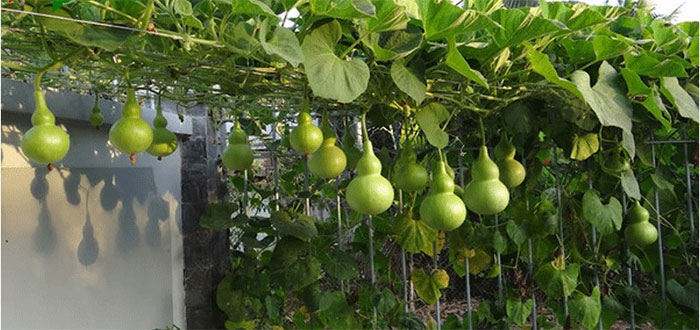Some vegetables and fruits are more bitter and poisonous, so you should absolutely not eat them
According to doctors at Hai Ninh Central Hospital (Zhejiang, China), in the summer, fruits and vegetables are sold in many markets and supermarkets, including vegetables. has a bitter taste.
Be careful when eating bitter vegetables
Many people believe that bitter vegetables will help relieve heat and bring health benefits. However, not all vegetables have this effect . In fact, in some vegetables, the bitter taste is not natural, but most likely contains hidden toxins . When eaten, the body will be poisoned. The hospital has received many such cases.
People need to note that cucurbits under certain conditions will produce cucurbitacin , a bitter-tasting toxin . There are more than 20 different types of this substance, but they all have one thing in common: strong toxicity, causing rapid poisoning after swallowing with the most common symptoms being nausea, vomiting, diarrhea, gastrointestinal bleeding, and liver bleeding. and kidneys. Symptoms can be more severe, even fatal.
Cucurbitacin is found in many cucurbits such as pumpkins, gourds, cucumbers. The two most common types of cucurbitacin are cucurbitacin B and cucurbitacin E. Cucurbitacin B is extremely toxic when eaten, type E is not as toxic but still Harmful to the body if swallowed.
3 types of fruit that have a bitter taste should not be eaten
1. Nam gourd (gourd)
Gourd is a fruit that people often eat in the summer. If gourds are cross-bred, their genetic makeup can be altered, creating bitter-tasting gourds.

Bitter gourd contains phytotoxins.
Bitter gourd looks no different from normal gourds, but it contains phytotoxins . Even after being processed at high temperatures, toxins in gourds are difficult to remove.
When eaten in a certain amount, we will likely get food poisoning, feel dizzy, have diarrhea, nausea, stomach pain, shock, and even death. Therefore, bitter gourds should absolutely not be eaten.
2. Luffa
Ordinary melon fruit does not have a bitter taste. If melon tastes bitter, it's best not to eat it to avoid food poisoning.
3. Long gourd
Bitter long gourds will also contain the same toxins as black gourds. Sweet long gourds and bitter long gourds are difficult to distinguish from the outside. Before cooking, we should peel a small piece and dab it on the tip of our tongue to feel the taste. If it tastes bitter, absolutely do not use it again.
In addition to the above three fruits, the cucurbit family also has other types such as pumpkins, squash, cucumbers, watermelons. if they are affected by negative impacts such as being trampled and oppressed during the growth process. or high temperatures will affect development. This leads to metamorphosis, producing a large amount of toxins.
Besides, bitter melon is also a fruit of the gourd family, but bitter melon is an exception . The bitterness in bitter melon mainly comes from substances such as glycosides, which are not only non-toxic but also bring many health benefits.
- Notes to keep fruits and vegetables the most nutritious
- Three types of 'bitter pungent' vegetables are good for health
- Fresh vegetables: How to use it for safety?
- 5 familiar vegetables are precious medicinal items
- What are the effects of eating white, brown vegetables, tubers and fruits?
- Students create functional foods from the first bitter vegetable in Vietnam
- 7 kinds of summer vegetables against cancer
- How to identify clean vegetables and vegetables that contain a lot of chemicals
- The more bitter the chocolate, the more anti-aging it helps
- Bitter foods are healthy
- Different kinds of vegetables and fruits should not be eaten together
- Eating 'white' vegetables and fruits can avoid stroke
 Soaking vegetables in salt water does not remove chemicals but you should still do it
Soaking vegetables in salt water does not remove chemicals but you should still do it You should limit bamboo shoots if you have 1 in 5 of these diseases
You should limit bamboo shoots if you have 1 in 5 of these diseases Mistakes when soaking vegetables in salt water
Mistakes when soaking vegetables in salt water Risk of death when combining shrimp with vitamin C
Risk of death when combining shrimp with vitamin C Three types of 'bitter pungent' vegetables are good for health
Three types of 'bitter pungent' vegetables are good for health  The effect of drinking bitter melon juice with health
The effect of drinking bitter melon juice with health  Students create functional foods from the first bitter vegetable in Vietnam
Students create functional foods from the first bitter vegetable in Vietnam  Bitter coffee, why are so many people
Bitter coffee, why are so many people  Many people cut the cucumbers so well and know why everyone will follow them
Many people cut the cucumbers so well and know why everyone will follow them  The bitter taste makes people more strict
The bitter taste makes people more strict 